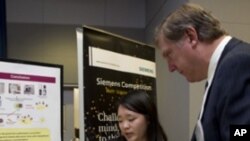Twenty U.S. high school students were in Washington, D.C., this week squaring off in one of the nation’s premier science research contests.
The prize: a half million dollars in college scholarship awards. It wasn't just prize money, however, motivating these Math, Science and Technology contestants.
These young competitors hope their innovations will make a positive difference in the world.
Andrew Xu is one of America’s rising young scientists. His mathematical equations are designed to enhance the performance of Internet communications and social networking sites like Facebook.
“Our project has the potential to improve the efficiency of such networks. And this is important because as networks become larger and larger, improving efficiency could mean saving costs,” said Xu.
Xu and 19 other high school students are finalists in the Siemens Foundation Annual Math, Science and Technology Competition in Washington. Each of the contestants hopes the judges will decide that his or her project is the most innovative and scientifically important.
John Solder invented ways light can be used to treat people with brain injuries and disorders like Alzheimer’s.
“And you have a fiber optic cable coming into the prefrontal cortex, where I was telling you disorders such as Parkinson’s and Alzheimer’s diseases can occur. So what you can do is get these light sensitive channels within the neuron itself, and using the light you can stimulate those neurons and help restore the function of the brain that you lost,” said Solder.
Seventeen year-old Cassee Cain and Ziyuan Liu won top honors in the team competition. They're sharing a $100,000 college scholarship for their bioengineering project.
They discovered how an inexpensive [Kinect] motion sensor and the popular X-Box 360 video gaming console can be used to improve the gait, or walking movements, of amputees.
“What we are really hoping to do is to give this affordable, portable and accessible system to the public in rural areas where they don’t have access to million-dollar gait labs,” said Cain.
Julia Crowley-Farenga and her teammate won third place for their research on how galaxies evolve. Julia wants to inspire more young people to follow in her footsteps.
“I worked with third-grade students after school for a science project, and it is really cool to see them and hope that they will one day go into science studies in high school. So I think it is about getting science into the minds of kids at a young age,” said Crowley-Farenga.
This year's highest individual science honor and a $100,000 scholarship went to Angela Zhang for her research on how cancer cells stimulate the growth of tumors. Now she and the other winners in the Siemens Foundation competition are well on their way to driving tomorrow's breakthroughs in science and technology.









